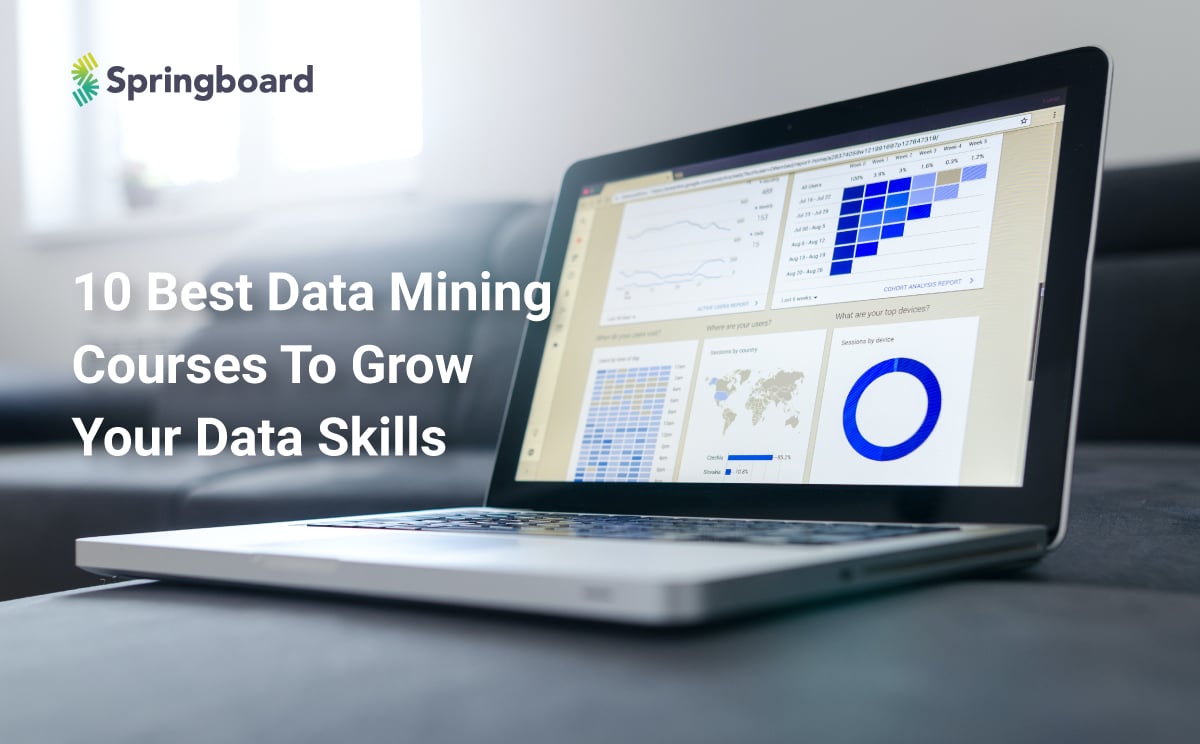Despite their differences in every imaginable way, the terms “data engineer” and “data analyst” are often used interchangeably, even by those in the world of data science. Understanding the differences between these two positions isn’t just a matter of roles and responsibilities. It’s also important to understand their differences so that you can better understand the whole data science process.
So if you’re confused about the two, or if you’re looking for clarification on their differences, then you’re in the right place. Below, we’ll break down the differences between a data engineer and a data analyst, in addition to detailing the requirements for each, what’s expected at the entry-level, and the kind of career path you can expect with each of these roles.
Is There a Difference Between a Data Engineer and a Data Analyst?
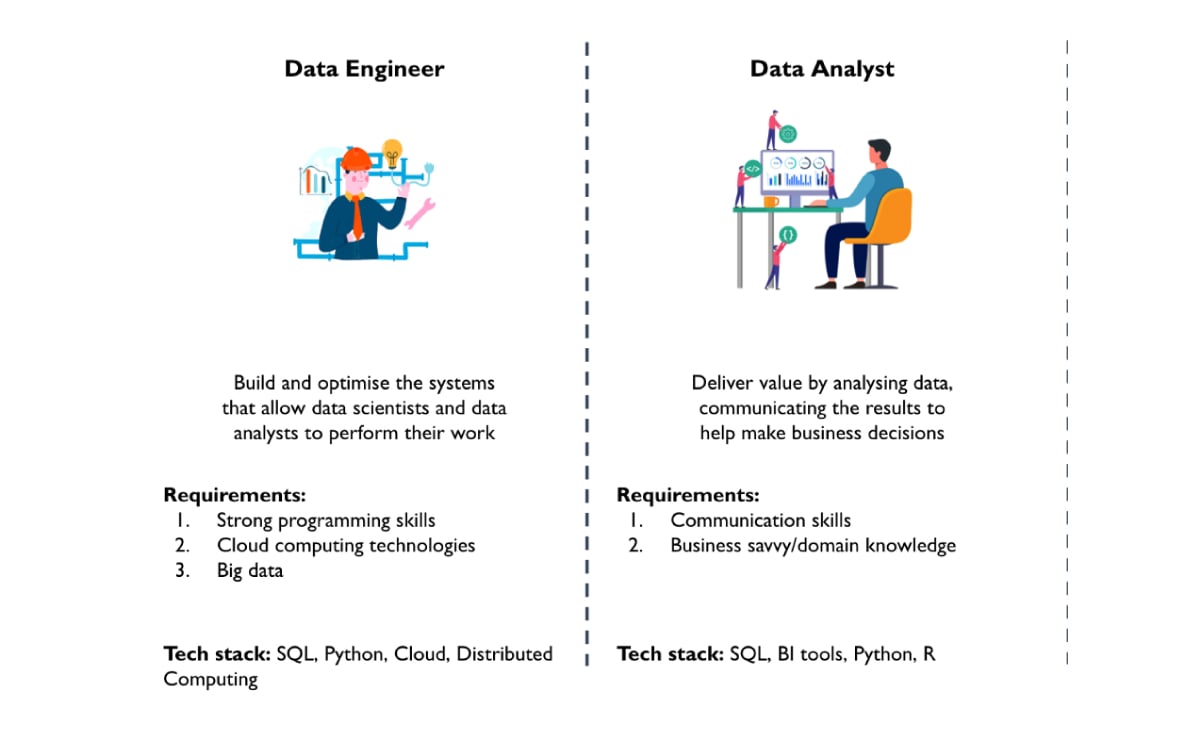
Yes. A data analyst combs through quantitative data to glean patterns and report them for strategic decision-making. A Data engineer, on the other hand, formulates tools to help with data transfer, data analysis, and other workflows that are peripheral to the actual data itself.


Become a Data Scientist. Land a Job or Your Money Back.
Build job-ready skills with 28 mini-projects, three capstones, and an advanced specialization project. Work 1:1 with an industry mentor. Land a job — or your money back.
The Disciplines
Let’s break down how these two specialties differ:
What Is Data Engineering?
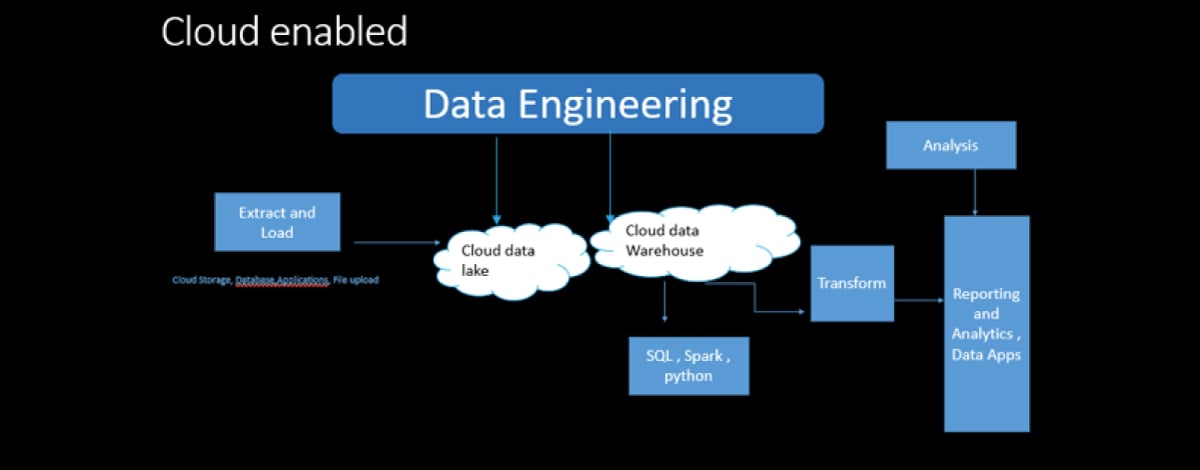
Data engineering is the process of building robust data architecture that allows for data processing. This includes data transfers between databases and building data warehouses for easy accessibility.
Through data engineering, the following question is answered: “How do I make all the data we collect easier for our data analysts and other stakeholders to wade through?” Data engineering makes the data more reliable, accurate, and ingestible through robust data processing systems.
What Is Data Analysis?
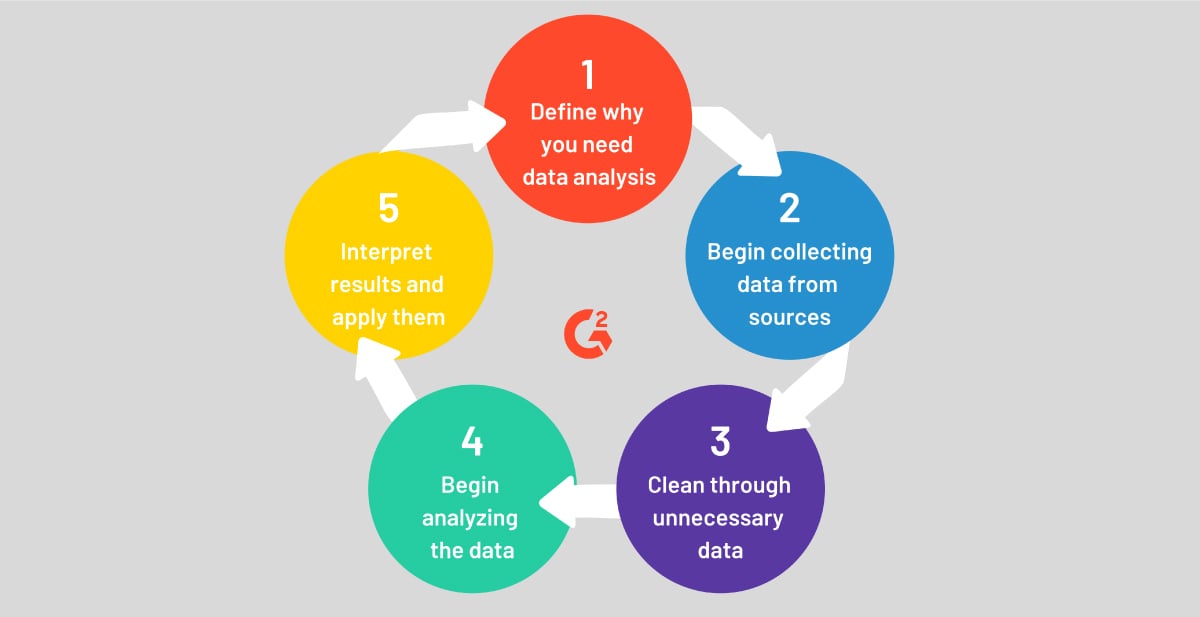
Data analysis is concerned with the questions of “What data do I need, and what is this data telling me?” Data analysis involves collecting and studying data points to find trends. Through data analysis, companies convert trends into actionable business insights, which then form the foundation of data-backed business decisions. Data analysts translate business problems into data search questions, find that data, and then visualize their findings.
The Role
Though data engineers and data analysts both work with data, their approach it in very different ways, and their roles reflect that:
What Does a Data Engineer Do?
Here is a fairly typical job description for a data engineer:

A data engineer is expected to:
- Manage overall data architecture comprising databases and data processing systems.
- Keep a tab on data quality parameters to optimize data performance and troubleshoot bugs and issues.
- Work towards improving data storage and accessibility.
- Build and execute data pipelines.
- Manage data infrastructure platforms and the datasets that reside within them.
- Construct, execute and manage data validation tests.
- Work with data analysts and data scientists (what’s the difference?) to ensure that the datasets are in the ideal format and stored in the correct system as per their needs.
What Does a Data Analyst Do?
Here is a daily typical job description for a data analyst:
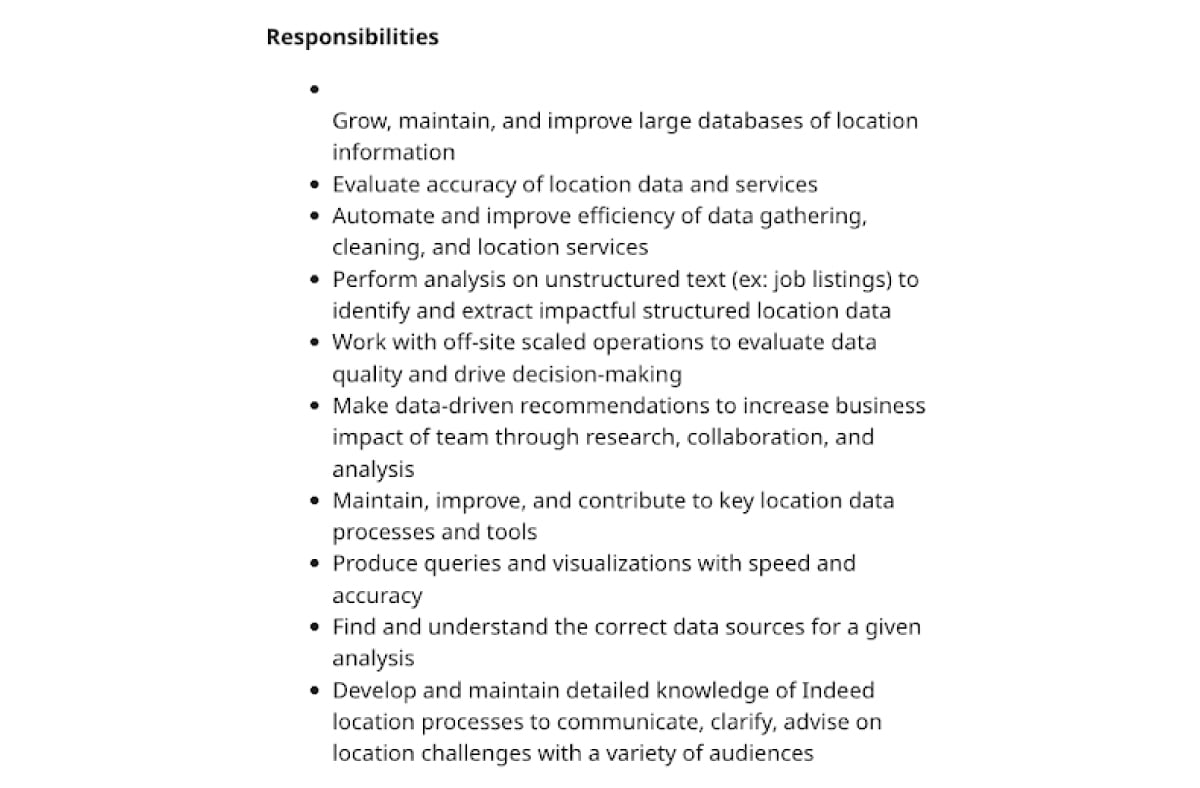
Data analysts also do the following:
- Grow and maintain databases and analyze data points to generate insights that can help inform business decisions.
- Collaborate with data scientists and data engineers to turn data into actionable insights.
- Engage in statistical analysis to identify trends in datasets and data visualization to represent these trends.
- Create reports that communicate vital findings for business stakeholders.
- Automate data gathering and data cleaning workflows.
General Requirements, Education, and Background
Like all data jobs of 2022, there are multiple ways to break into the relevant field:
What Are the Requirements To Become a Data Engineer?
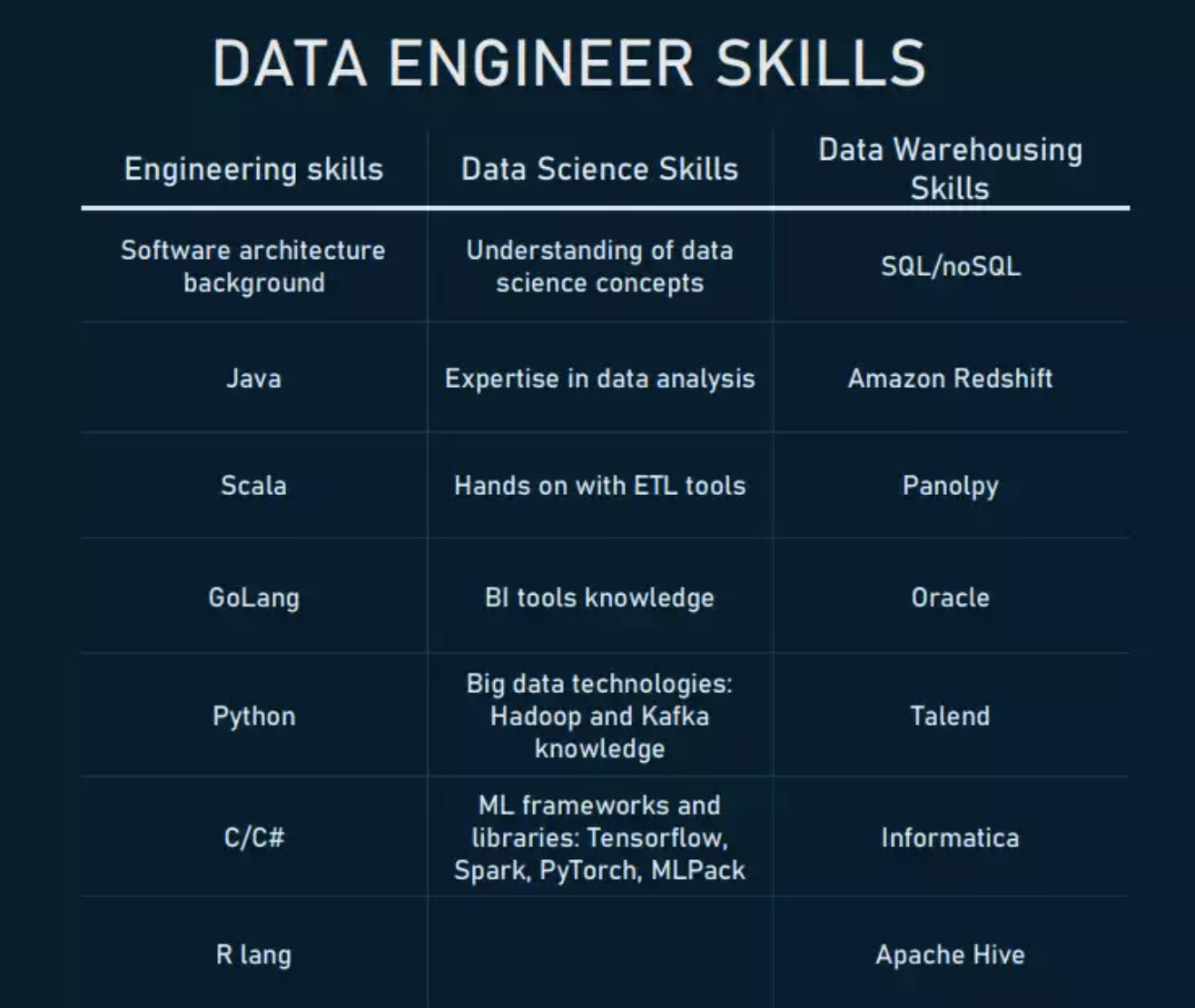
Becoming a data engineer will take about 4-5 years if you go down the degree path. Otherwise, it can take you 1-2 years to be job-ready. Either way, what you’ll need to make that happen:
- A bachelor’s degree in data engineering, data science, software engineering, math, or related fields (Or, a background in data engineering through project-based experience/bootcamps)
- Master relevant software development skills (as outlined in the subsequent section) and engineering skills through internships and additional certifications that provide accreditation
- Showcase experience in Java and Python through a portfolio of personal projects if your internships do not reflect this skill
- Create a resume, prepare for data engineering interviews (especially related to SQL), and apply to junior data engineering jobs
What Are the Requirements To Become a Data Analyst?
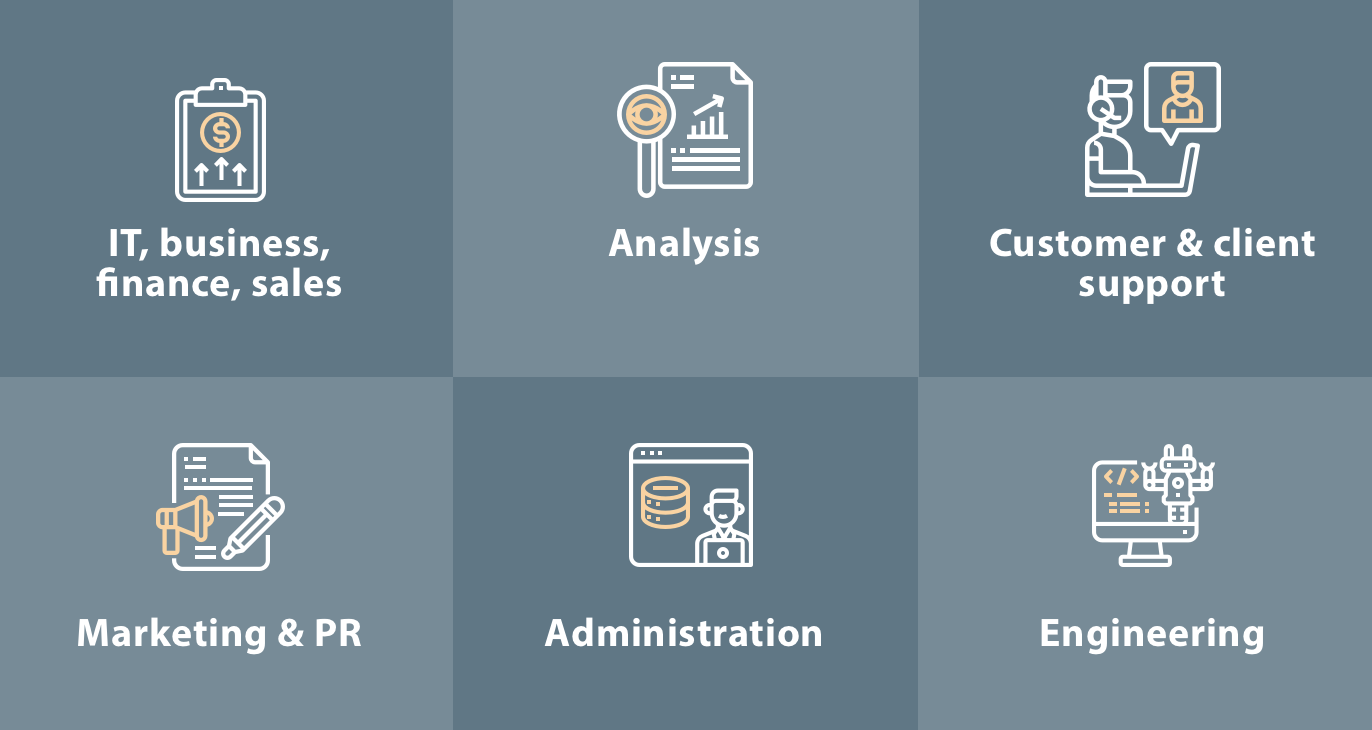
The path remains pretty much the same in terms of the general checklist. Here’s what you’ll need to become a data analyst:
- A bachelor’s degree in computer science, math, or related fields. You may also need a Master’s degree, depending on the company. Alternatively, a data analyst bootcamp or background in the same through self-learning will also be sufficient
- Acquiring skills vital to a data analyst’s role and creating a portfolio.
- Getting relevant certifications
- Curating your resume based on relevant internships
- Preparing for interviews to land your first job
Get To Know Other Data Science Students
Brandon Beidel
Senior Data Scientist at Red Ventures
Esme Gaisford
Senior Quantitative Data Analyst at Pandora
Karen Masterson
Data Analyst at Verizon Digital Media Services
Data Engineer vs. Data Analyst Skills
Assessing the different skills that both these job roles require will help you decide which might be a better fit for you. These hard and soft skills will benefit you in any job in data engineering or data analysis, respectively.
What Skills Does a Data Engineer Need To Succeed?
Here’s a rundown of technical and soft skills that all data engineers should have:
Technical Skills
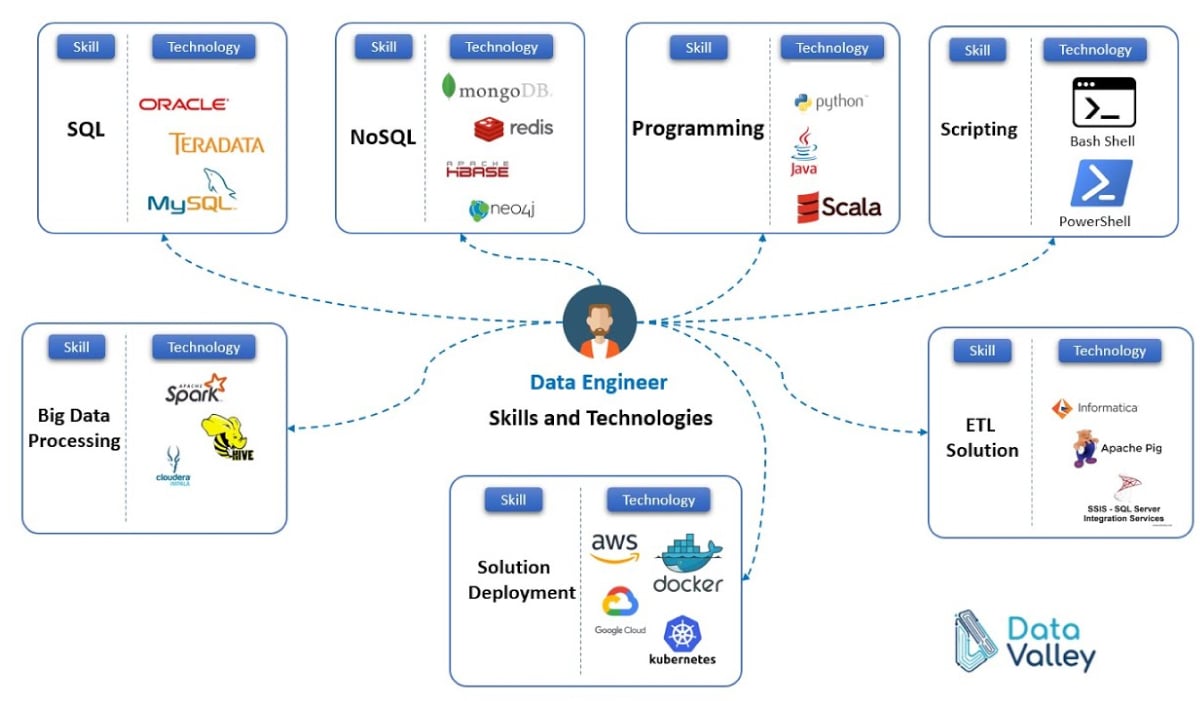
- Programming languages like Java, Scala, and Python. Data engineering is a coding-heavy field; therefore, an advanced understanding of at least a few programming languages like Java and Python (and basic knowledge of the other commonly used ones like R and Scala) will make you a strong candidate for jobs.
- Databases and operation systems. A solid grasp of Structured Query Language (SQL) is a fundamental technical skill for a data engineer. It is vital to manage data held in database management systems. You must also navigate different operating systems like UNIX, Windows, Linux, and Solaris.
- Machine learning. Data engineers deploy machine learning models to assist with data architecture frameworks. Further, companies like Google have data engineering exams as a part of their filtering process, which asks some machine learning questions. Therefore, a basic understanding of machine learning in the context of data engineering is essential.
Soft Skills
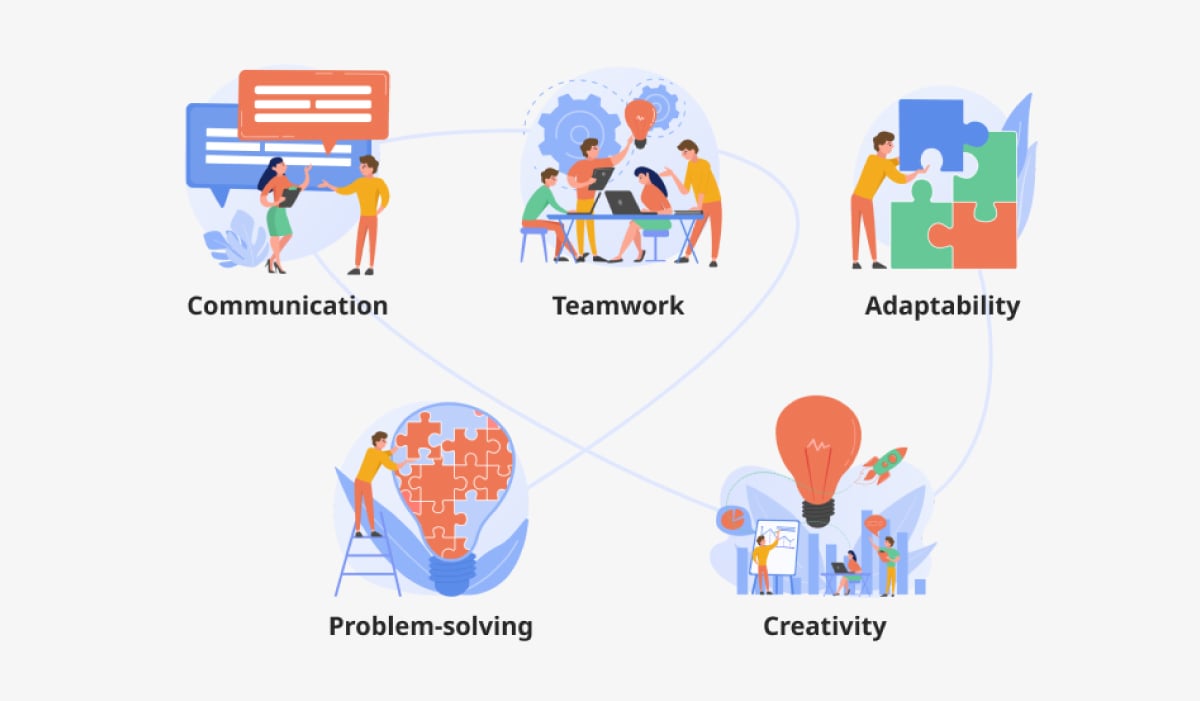
- Analytical mindset. Data engineers will often deal with data processing problems related to some gap in the data architecture from other teams. To solve these queries, a data engineer should have the foresight to see how the problem and inevitable solution affect the overall data warehousing outcomes and the ability to analyze the problem from all angles.
- Focus. Since data engineers are constantly building systems for varying data needs for data scientists and analysts, maintaining focus across different use cases is an invaluable skill.
- Organization. Data engineers manage vast volumes of data across many databases and systems. It is a crucial soft skill to learn how to optimize all the tools at their disposal for efficient data organization.
What Skills Does a Data Analyst Need To Succeed?
These skills will get you far as a data analyst:
Technical Skills
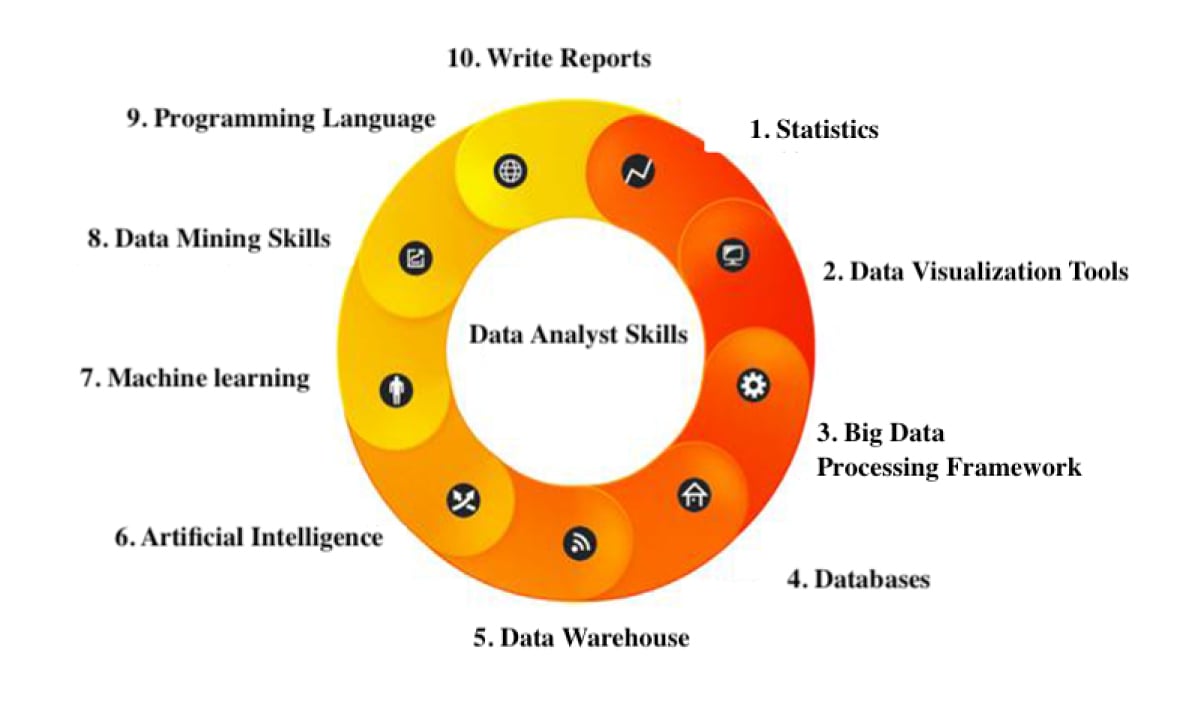
- Programming languages like Python, SQL, and R. A data analyst is not required to code. A basic understanding of programming languages like R is sufficient for preliminary data wrangling.
- Data visualization. Communicating quantitative trends to other business teams requires storytelling and data visualization. They need a clear understanding of what you found, and it’s your responsibility to help them understand the impact of your data. data analysts will have multiple data visualization skills at their disposal.
- Statistical analysis. A data analyst’s primary role is to interpret large datasets. Drawing conclusions from this data using applied mathematic models is central to the process. Knowing how to use statistical programming languages like SQL and R will help study large datasets.
- Research skills. Finding accurate and updated datasets requires advanced research skills. Understanding how this data has been used in the past and how they can use it better will also need strong research skills.
Soft Skills
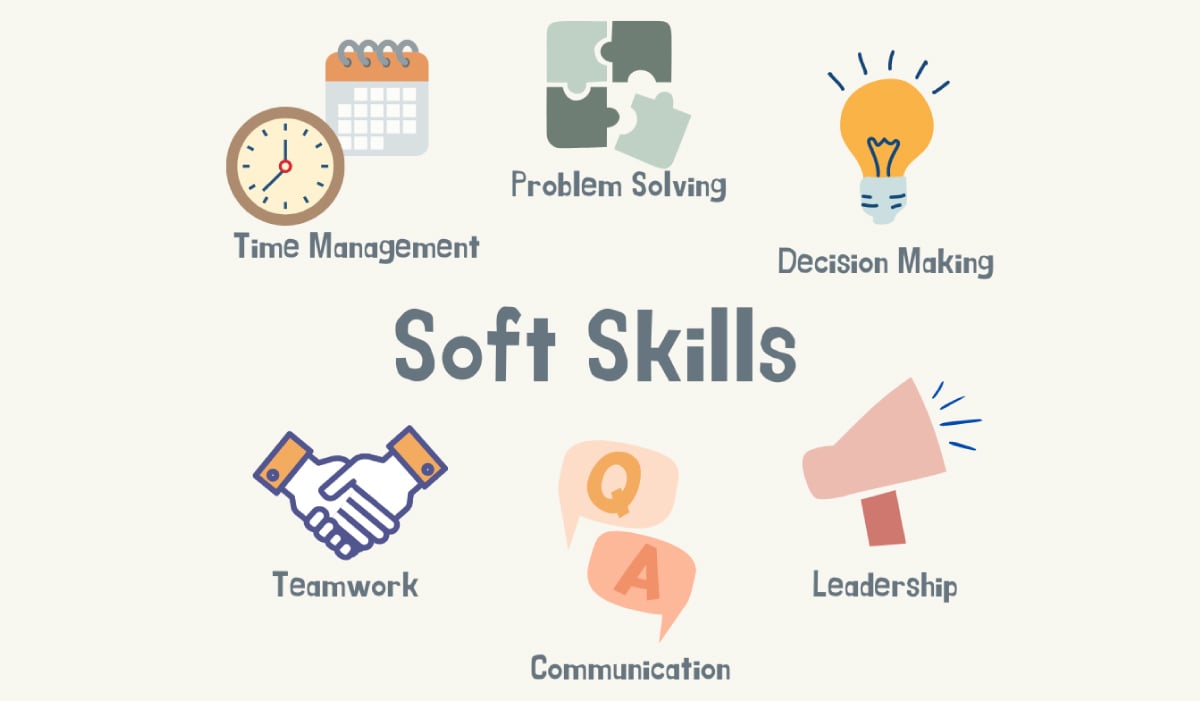
- Critical thinking. When data analysts are looking for patterns in data, they first need to gauge what to look for in the first place. Finding patterns comes from logical and critical thinking—asking the right questions can make uncovering connections easier.
- Analytical mindset. Like data engineers, even data analysts require strong analytical skills. The curiosity to find as many patterns in a dataset as possible and logically arrive at valuable insights backed by data are indicators of a great data analyst.
- Problem-solving. Data analysts sometimes deal with unclear beginnings (“are we looking for something that exists?”), murky progress (“this dataset has everything I need but is it the most recent?”) and other problems. A straightforward approach to troubleshooting problems will benefit a data analyst.
- Communication Skills. A data analyst may have found valuable insights, but the company may lose out on a promising strategy if they cannot communicate them to business leaders. Being able to relay the information in a layperson’s language, both visually and otherwise, is important.
Career Path
What Is a Typical Career Path for a Data Engineer?
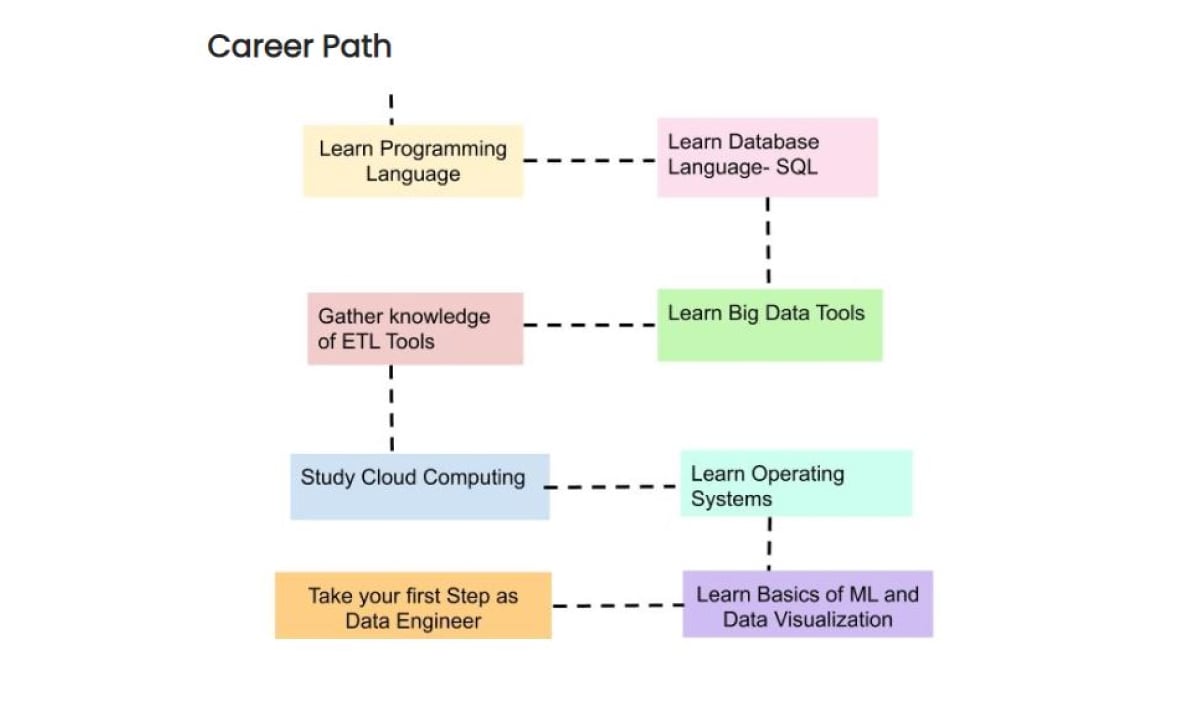
Most data engineers start as interns, usually with a degree in software engineering or computer science. Entry-level jobs as a junior data engineer involve supporting the team with data pipeline building and data wrangling. You will contribute to smaller projects that deal with data delivery architecture building. As you amass more experience, you can transition to senior data engineering roles, and eventually become a (CDO). CDOs play managerial roles and oversee the compliance of data collection and management regulations across the organization.
What Is a Typical Career Path for a Data Analyst?
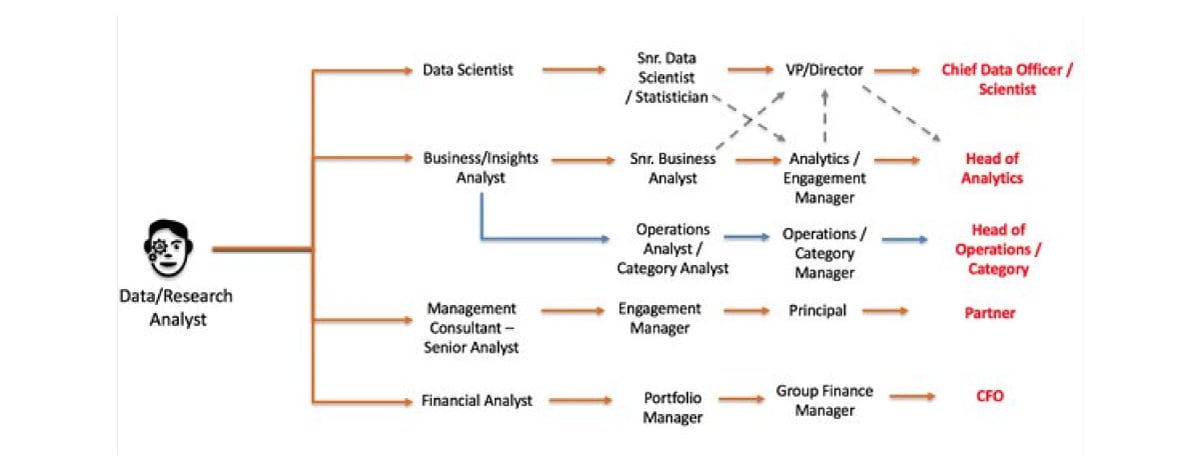
To become a data analyst, you need to master some core skills. You can either do that through a data analyst course or a conventional degree. You can apply to junior data analyst jobs in the first 1-2 years. You will be tasked with collecting data, writing reports, creating statistical visualizations based on the data, and implementing data collection systems. As a senior data analyst, you will be able to draft data collection processes (rather than just follow them) and contribute to streamlining the entire data collection and analysis framework.
Depending on your interests, you can also specialize within the field. If you are interested in digital marketing, healthcare, finance, or any industry that requires a lot of data (most of them do), you can specialize in these fields. For example, you can become a business analyst.
Another option is transitioning to other generalist data engineer or data scientist roles.
Data Engineer vs. Data Analyst: Salary
A data engineer earns slightly more than a data analyst, but just how much more depends:
What Does a Data Engineer Make?
On average, a data engineer in the US earns an annual salary of about $111K, which can go as high as $128K, depending on the organization and location.

What Does a Data Analyst Make?
A data analyst makes about $81K, with the typical salary in the US falling in the $72K-$91K range.

Data Engineer vs. Data Analyst: A Day in the Life
Here’s a detailed breakdown of what data engineers and data analysts do on the job regularly:
What Does an Average Day Look Like for a Data Engineer?

A data analyst’s daily tasks involve structuring datasets ready for analysis. Their day includes the following:
Stand-Ups
A stand-up is a daily/weekly check-in meeting where the team comes together to discuss any obstacles anyone may be facing, their goals for upcoming projects, and get updates on ongoing projects and other career opportunities. This is where suggestions and recommendations come together while brainstorming ideas, which helps everyone be on the same page.
1-to1s
A 1-to-1 is a learning opportunity for data engineers working on especially challenging projects. Depending on how senior you are, you will either be conducting these 1-to-1s or attending them with a supervisor. Through these sessions, you get more clarity on team expectations.
Collect and Categorize Data
This constitutes the bulk of a data analyst’s day. They clean data in Excel or other tools, investigate data using SQL and create reports.
Code Review
This involves writing SQL scripts and engaging in other investigative data work while ensuring that all data requirements are met, and the codes run smoothly.
What Does an Average Day Look Like for a Data Analyst?
A data engineer’s daily tasks improve an organization’s data management workflows and systems. These include:
Stand-Ups
Like data analysts, data engineers also have check-in or sync meetings to identify obstacles and track progress.
1-to1s
The 1-to-1s are for going through bugs and troubleshooting any issues that may come up.
Jira (or Other Sprint-Planning Platforms)
Jira (or similar platforms) have tickets with tasks such as data pipeline implementation, query performance tuning, or data quality checks.
Data Diving
Data mining or data dives involve data exploration, data standardization, and building data warehouses for data that has been deemed too hard to parse by data analysts and other teams.
Code Review
This involves writing, testing, or running code on the data to ensure seamless execution.
Becoming a Data Professional: Where To Start
There are many ways to become a data professional. Evaluate these options based on where you are in your career (are you just starting out or contemplating a transition?), your financial position, and how much time you want to give yourself to become a data professional with marketable skills.
How To Become a Data Engineer
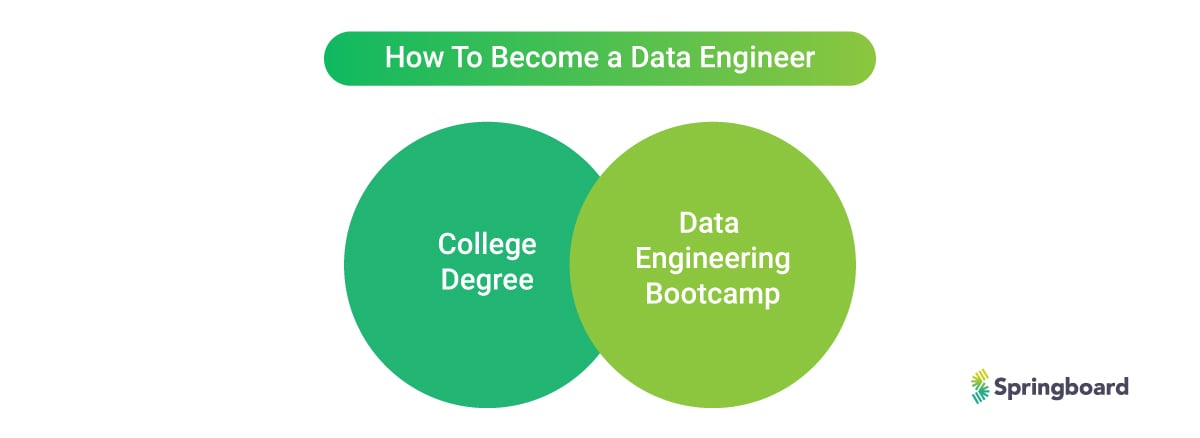
To become a data engineer, you have two main options:
College Degree
You do not need a related degree to become a data engineer, but a degree in data science, computer engineering/computer science, or statistics can serve as an excellent foundation if you are contemplating a degree. Remember, many companies have dropped the requirement of a related degree for data engineering jobs, while some require a master’s degree too (in statistics or engineering).
Data Engineering BootCamp
If you do not want to do a degree, either because you have already spent years pursuing a degree or do not have the financial capacity to undertake a full-time degree, consider a course or bootcamp instead. A bootcamp fast tracks the learning process at a fraction of the cost. If you choose the right bootcamp which aligns with your career goals, you can go from a novice to someone who is more than qualified for entry-level jobs as a data engineer.
How To Become a Data Analyst

You have three options for becoming a data analyst:
College Degree
A bachelor’s in data analytics, computer science, or economics (with an emphasis on statistics and applied mathematics) are prudent alternatives. A degree is not necessary and is often a heavy financial commitment, especially if you discover you are not as interested in the field as you initially thought.
Certified Courses or an Online BootCamp
You can test the waters with certified courses and online bootcamps that cover the same concepts that a traditional degree would in a structured way. Go for data analyst bootcamps with faculty members with practical experience in the industry, and you will learn everything you need to know to land data analyst roles in under a year.
Self-Taught Route
You can also consider the self-taught route if you have the time and freedom to shape your learning process. Plenty of books and free online resources are available, which can help you along the way. Many Data Analysts provide learning material on their social media platforms or YouTube channels. These resources can be sufficient to learn the basics and bag an internship.
Data Engineer vs. Data Analyst FAQs
We’ve got the answers to your most frequently asked questions:
How Do I Know Which Is the Right Career Choice for Me?
Data analysts try to find patterns in data sets, whereas data engineers try to build tools to make the data more accessible and digestible. Therefore, assess your technical skills to know which is the right career choice for you.
Find out what interests you by doing free certificate courses and reading up as much as possible about how data engineers and data analysts spend their days on the job. Test your skills through internships. Both are viable options, so it comes down to what you want.
How Do I Know Which Is the Right Career Choice for Me?
Comparing the difficulty level of data engineering and data analytics is akin to comparing apples and oranges. Both career options require different skill sets, even though data engineers and data analysts often work together.
Data engineering has a few more requirements, and their average salary is higher, but the difficulty level will depend on where your strengths lie and your career outlook.
Do Data Engineers Code?
Yes. Data engineering requires advanced coding skills. Programming skills are vital since they will work with tools that require diverse coding knowledge as they try to understand how to make the data more “clean.”
Can a Data Analyst Become a Data Engineer?
Yes. As you complete more data analysis projects and open yourself up to the data landscape, you will realize that there are many intersecting points of expertise between a data analyst and a data engineer. You may have to learn some additional key skills, such as acquainting yourself with big data platforms and data pipelines like ETL.
Since you’re here…
Considering a career in data analytics? We can get you there. Don’t take our word for it – check out our student reviews. After just 6 months of study in our fully flexible Data Analytics Bootcamp, we’ll boost you into a job in the field or your tuition back. Get started now with our free data analytics course.






